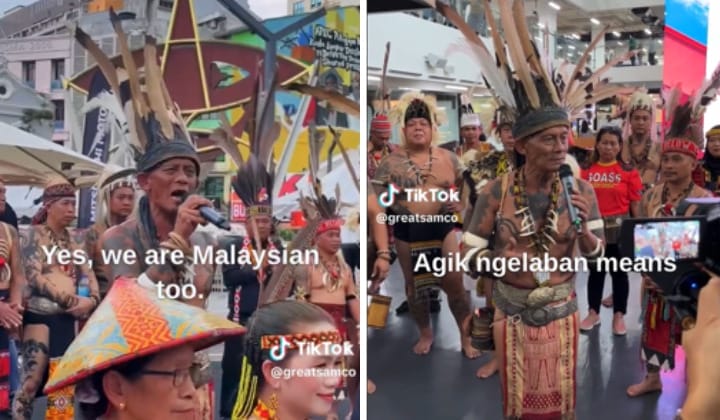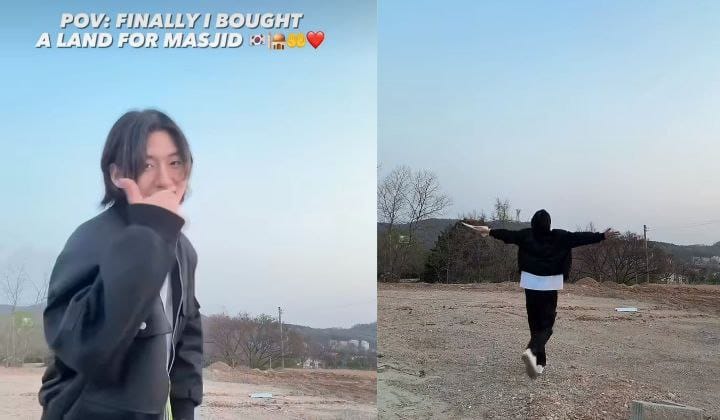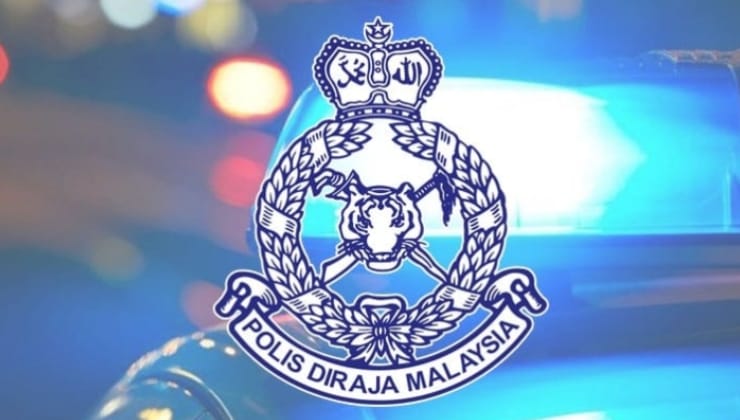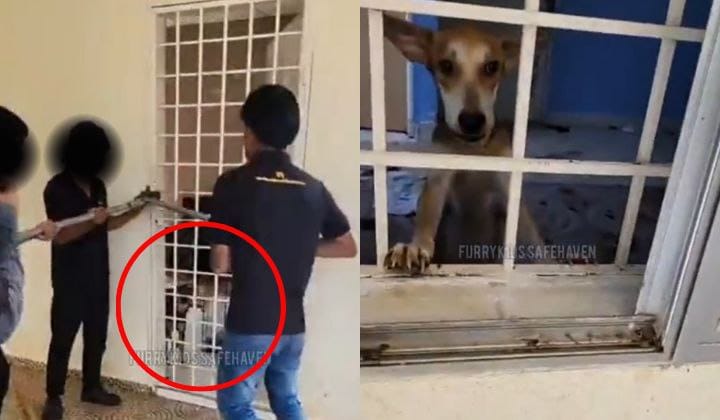Did You Happen To See Borneo Natives In KL Last Week? Here’s Why They Were Here
Sabah and Sarawak’s diverse culture and customs are known all over the world.

Subscribe to our Telegram channel or follow us on the Lumi News app for the latest stories and updates.
Did you happen to catch a group of Sabah and Sarawak natives in a walkabout around Kuala Lumpur recently?
The walkabout was part of the Borneo Native Festival where these indigenous communities from Sabah and Sarawak united and took to the streets of Kuala Lumpur to proudly display their stunning traditional attire.
Captured in a series of TikTok videos by @greatsam, a group of Dayak natives paraded through the city with a clear purpose: to remind the world of their continued presence.
@greatsamco Part 1. History was made for the first time our ethnic group from Sabah and Sarawak dance on an @AirAsia aircraft above the clouds, enroute to kl. This is a series of short stories from my perspective, following @Panglima Peter John Jaban in his journey to put our native people on the map of Malaysia. You will be surprised how many people are clueless of who they are despite holding the same Malaysian ID card as them. #tiktok #fyp #trending #fypmalaysia #viral #foryoupage #malaysiatiktok #malaysia #kualalumpur #pasarseni #trendingsong #foryou #foryourpage #centralmarketkualalumpur #malaysia #kualalumpur #pasarseni #centralmarketkualalumpur #borneo #sabah #sarawak #borneonativefestival2023 #borneonativefestival #b#BNF #kaamatan #Undukngadau #sape #bellaastillah #ratucantik #perarakanBNF #borneo #sabah #Sarawak #traditional #sukaseni #visitmalaysia #pestaborneo #bnf2023 #storiesthatmatter
♬ original sound – greatsam – greatsam
Their eye-catching traditional outfits attracted widespread attention, prompting numerous spectators to record this extraordinary event.
According to @greatsam, the ethnic group from Sabah and Sarawak led by the group’s leader, Peter John Laban, was also invited by AirAsia to visit their RedQ headquarters.
This is a series of short stories from my perspective, following Panglima Peter John Jaban in his journey to put our native people on the map of Malaysia.
@greatsam via TikTok
@greatsamco Part 3. Is this what everyone wants? A strong statement from @Panglima Peter John Jaban was captured to share the essence of what we call, harmony. The parade happened in conjunction to the Borneo Native Festival 2023 at Central Market, KL. This is a series of short stories from my perspective, following Peter John’s in his journey to put our native people on the map of Malaysia. #fyp #trending #fypmalaysia #viral #foryoupage #malaysia #kualalumpur #pasarseni #centralmarketkualalumpur #borneo #sabah #sarawak #borneonativefestival2023 #borneonativefestival #kaamatan #gawai #Undukngadau #sape #borneo #traditional #sukaseni #visitmalaysia #bnf2023 #storiesthatmatter#agikidupagikngelaban
♬ original sound – greatsam – greatsam
Additionally, these individuals were observed boarding the MRT train, where fellow passengers enthusiastically captured photographs of them.
The atmosphere was characterized by convivial exchanges centered around their native heritage.
These footages serve as a powerful representation of Malaysia’s diversity, illustrating the essence of harmonious coexistence among individuals from various cultural backgrounds who peacefully live together.
There were alot of people asking us while we walked on the streets of Petaling Street if we hailed from Indonesia? I said no. We are Malaysians. Yes we are Malaysians too, despite how we look. We have all kinds of religions in Sarawak and we live in harmony with one and another. This is what we want.
Panglima Peter John Jaban
@greatsamco Part 4. Never give up! This is a series of short stories from my perspective, following @panglimapeterjohnjaban’s in his journey to put our native people on the map of Malaysia. @flyairasia @sukaseni_my @waupost bnf2023 culture storiesthatmatter agikidupagikngelaban sabahonsoi #nevergiveup
♬ original sound – greatsam – greatsam
Although many on social media were amazed by the viral videos, there was one individual who chose to leave a negative comment on the viral post.
In her tweet, the Twitter user remarked that no one was denying the existence of these native people.
After being called out on her tweet, she followed on with comments saying that the existence of the natives have never been questioned and it brought no sense for them to ‘dance around Kuala Lumpur semi-naked’.
Ada aku ckp aku tk agree ke dgn video tu? Betul la dorg exist. Klau org tkthu bgtahu, org akn terima. Sbb mmg dorg tak thu. Takya la sampai susah payah nk menari separa bogel tgh KL. Ada org deny dorg bukan Malaysian ke?
Twitter user
This comment sparked a cascade of responses from others, who dissected and criticized the problematic nature of her viewpoint.
Twitter user @beatriceluma said while it is true that the existence of natives is not denied, many Sabahans and Sarawakians are still stereotyped.
Nobody denied it, but still, most Sarawakian and Sabahan get stereotyped. Thankfully, my circle of friends on the other side would never do such a thing, but I know people out there still do.
@beatriceluma via Twitter
In another set of tweets, she added that her culture and many other minority cultures shouldn’t just exist, instead it should thrive and grow.
It should be appreciated and treasured. It is a part of Malaysian culture. What makes Malaysia, Malaysia. It is a multicultural country where all races live together in harmony. I’m sorry if you don’t appreciate your own culture and heritage the way Sarawakian and Sabahan do with theirs. We are strangely fiercely loyal and defensive about it. If you have nothing better to say, just keep quiet. Why air out your dismissal as if we are not part of Malaysia?
@beatriceluma via Twitter
Another Twitter user @kiminoriii also chipped in calling out the original tweet rude and unkind.
Hi, I think it is very rude for you to utter these kinds of wording about other people’s culture. if you don’t wanna see it, you don’t have to see it. I don’t think it’s harmful for the public to learn about others’ cultures, especially those West Malaysians.
@kiminoriii via Twitter
She also added that it was high time we start respecting people’s culture.
You don’t have to say ‘kenapa nak separa bogel’. That’s their traditional attire, tak suka tengok, you can just scroll and go.
@kiminoriii via Twitter
Nevertheless, Sabah and Sarawak have always had a celebrated uniqueness when it comes to their culture and customs.
Home to numerous indigenous communities, each with its distinct customs, languages, and belief systems, the natives of these states, collectively known as Bumiputera, proudly preserve their unique customs and traditions, providing a captivating glimpse into the rich tapestry of Borneo’s cultural landscape.
The Kadazan-Dusun, Murut, Bajau, and Rungus are among the prominent indigenous groups in Sabah, while the Iban, Bidayuh, Orang Ulu, and Melanau are well-known in Sarawak.
These communities have nurtured their cultural heritage for generations, passing down traditions that are integral to their identity.
Festivals and Ceremonies
Festivals play a significant role in the cultural fabric of Sabah and Sarawak.
The Harvest Festival, known as Pesta Kaamatan in Sabah and Gawai Dayak in Sarawak, celebrates the bountiful rice harvest and serves as a time for communities to express gratitude through cultural performances, traditional games, and feasts.
Other notable festivals include the Murut Magahau Harvest Festival, the Bajau Horse Festival, and the Iban Pukul Tiga Festival, each offering unique insights into the customs and beliefs of the respective communities.
Traditional Practices and Beliefs
The indigenous communities of Sabah and Sarawak have a deep connection to the natural environment and maintain traditional practices that reflect their close relationship with the land and the spirits.
The Iban practice the art of tattooing, known as “bunga terung” or “bunga seranjang,” which holds cultural and spiritual significance.
Traditional healing methods, such as the use of medicinal plants and rituals, continue to be passed down through generations, preserving ancient wisdom and herbal knowledge.
Arts, Crafts, and Music
The native communities of Sabah and Sarawak are also renowned for their exquisite craftsmanship and artistic expressions.
Intricate beadwork, weaving, and woodcarving are integral to their cultural heritage.
The Pua Kumbu textiles of the Iban, the delicate beadwork of the Kelabit, and the intricate brassware of the Lun Bawang are examples of the craftsmanship that showcases the skills and creativity of these communities.
Traditional music, featuring instruments like the sape (a lute-like instrument) and gongs, adds rhythm and melody to cultural performances and ceremonies.
In conclusion, the customs and traditions of the indigenous communities in Sabah and Sarawak are an integral part of Malaysia’s cultural mosaic.
Their deep-rooted connections to the land, vibrant festivals, intricate craftsmanship, and spiritual practices all contribute to the rich tapestry of Borneo’s cultural heritage.
By embracing and celebrating the customs of Sabah and Sarawak natives, we honor the diversity that make Malaysia a truly remarkable and culturally vibrant nation.
Share your thoughts with us via TRP’s Facebook, Twitter, and Instagram.








